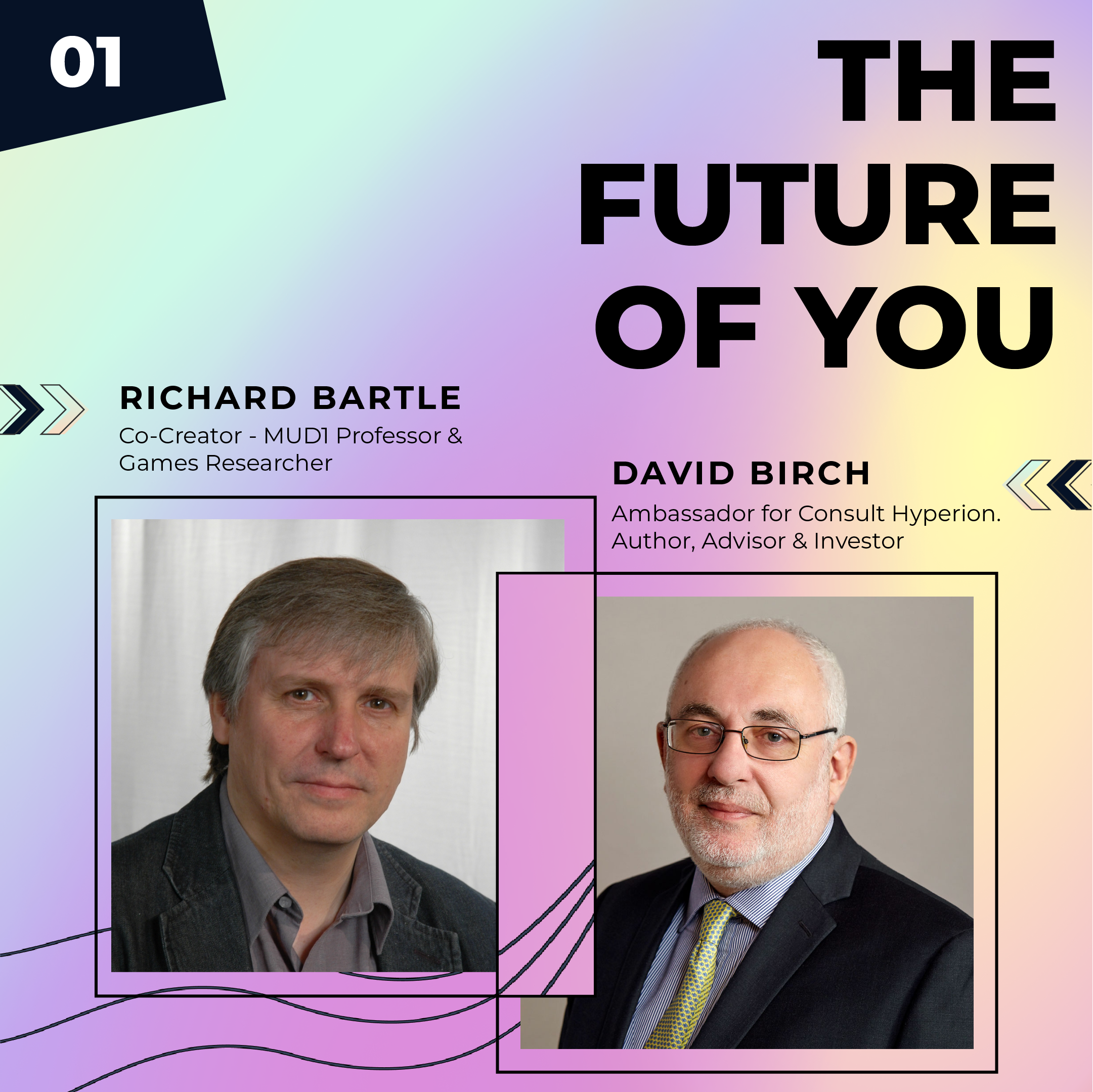🍎 Apple Podcasts: https://apple.co/3IfQRNR
🎧 Spotify: https://spoti.fi/3t1nf0b
🎙️ Google Podcasts: https://bit.ly/33ok5e2
📱 Amazon Music: https://amzn.to/3h7TTrl

Welcome to The Future of You, a podcast where we’ll explore the various ways in which emerging technologies will affect our identity.
Kicking off our journey into the future of the digital self, we’ll hear from two of the brightest minds in virtual worlds and digital financial technology.
Richard Bartle is the Co-Creator of MUD, the oldest virtual world in existence, and is a legend in the video game research space, while David Birch’s expertise in FinTech is demonstrated through contributions to Forbes, as well as his spot as one of WIRED’s Top 15 sources of business information globally.
This tour de force of an episode takes us through the concepts of experimentation with identity, self-tokenization, interplay between virtual & physical worlds, and the fine line between credentials and biometric identification.
This episode of The Future of You covers:
- How our characters in virtual/game worlds can differ from - and influence - our real world identity
- The gamification of our personalities on different platforms
- Tokenization of the self
- The interplay between the digital and physical worlds and our ‘economic avatars’
- How biometrics could play into credentials & identification, and the difference between the two
The TBD Conference - Get 25% off your tickets with code FUTUREOFYOU:
https://www.thetbdconference.com/
Links & references
Tracey Follows:
https://www.linkedin.com/in/traceyfollows/
https://twitter.com/traceyfutures
Futuremade Consulting:
https://www.linkedin.com/company/futuremadeconsulting/
https://twitter.com/_futuremade
Richard Bartle:
https://www.linkedin.com/in/richardbartle/
https://twitter.com/Richard_Bartle
David Birch:
https://www.linkedin.com/in/dgwbirch/
https://twitter.com/dgwbirch
Consult Hyperion:
https://www.linkedin.com/in/dgwbirch/
https://twitter.com/chyppings
Key highlights
"After playing these Massively Multiplayer Online Role Playing Games (MMORPGs) for 2-4 hours every night for 2 years, then players will be and become the characters. So it's a way of exploring who you are; you get to be and become yourself through playing these games.” - 6:10 - Richard Bartle
"In a role playing game, like Dungeons and Dragons, or one of the massive multiplayer games, then you can change the character. So it's not just you moving from one direction, you're moving from both directions. That gives you an understanding of who you can be, and who you really are without the constraints of what reality has set for you.” - 9:00 - Richard Bartle
"I wonder if actually, during the pandemic, and with the amount of stress and pressure and expectations that there are among teens especially these days, whether that's one of the attractions to these sorts of virtual worlds?” - 11:55 - Tracey Follows
"To some extent, first thing this morning I was on LinkedIn, playing the role of Dave Birch, the digital identity guru. Then a bit later on, I was on Twitter playing the role of cryptocurrency sceptic, and so on. I am just curious as to someone who's very steeped in these worlds, the extent to which you think there is a kind of gamification of our characters underway.” - 15:50 - David Birch
"The danger is that when you bring things in from other contexts, it can remove your freedom. So if somebody from LinkedIn walked into your Dungeons and Dragons session and watched you play, you would be a little more self-conscious than you would be normally.” - 18:30 - Richard Bartle
"Some players are achievers and they want to win the game on its own terms. So they don't like it when somebody can succeed on other terms by paying money. I may be the world 100 metre champion but I'm gonna retire now so I don't need this title anymore. Who wants to buy the title of being the world's fastest man? It doesn’t work - you can’t buy other people’s credentials.” - 23:30 - Richard Bartle
"People would begin to do business with each other in these tokenized environments inside these virtual worlds, not because they have some underlying deep seated commitment to anti-censorship money, but simply because it's cheaper and easier. It's cheaper and easier to interact, but crucially interact economically.” - 27:05 - David Birch
"The kind of dystopian world that biometric identification presents, I can see players going straight to game worlds where they don't have to do that, or to other sites where they don't have to do that. Because what have you got to hide? Well, actually there’s quite a lot I've got to hide. I don't want people coming along and persecuting me for my views in any way whatsoever, and I don’t want the government clamping down on what I say because it doesn’t fit what they want.” - 38:25 - Richard Bartle
"The cost of financial intermediation has gone steadily up despite the invention of transistors and laser beams, and self-tokenization is a way of bringing it back down again.” - 43:20 - David Birch
"I would say that it's liberating if you can have multiple identities, not so liberating if you've only got one identity, and thoroughly oppressive if you have to display that identity to anybody who wants to see it. It's just a case of ‘Papers please’, isn't it?” - 47:05 - Richard Bartle

